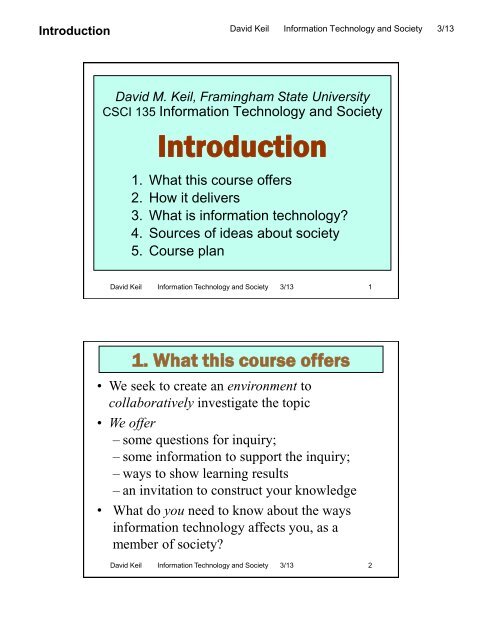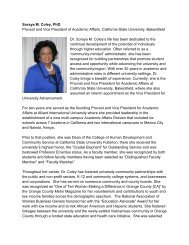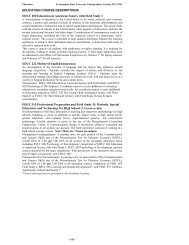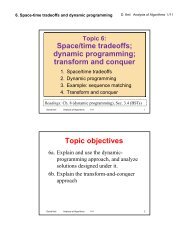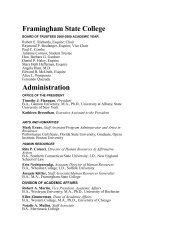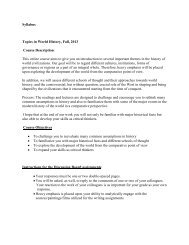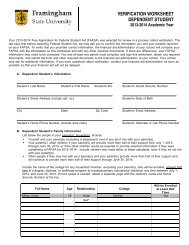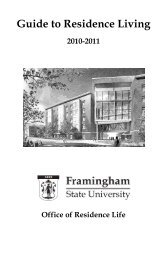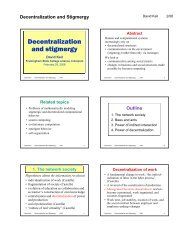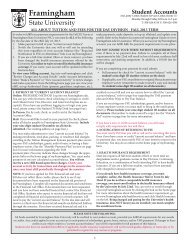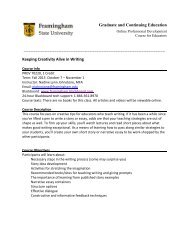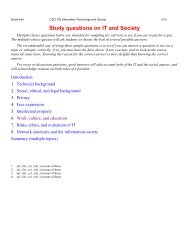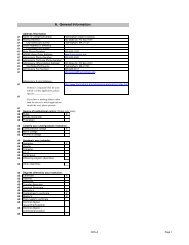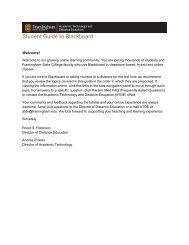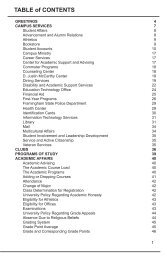Introduction - Framingham State University
Introduction - Framingham State University
Introduction - Framingham State University
You also want an ePaper? Increase the reach of your titles
YUMPU automatically turns print PDFs into web optimized ePapers that Google loves.
<strong>Introduction</strong><br />
David Keil Information Technology and Society 3/13<br />
David M. Keil, <strong>Framingham</strong> <strong>State</strong> <strong>University</strong><br />
CSCI 135 Information Technology and Society<br />
<strong>Introduction</strong><br />
1. What this course offers<br />
2. How it delivers<br />
3. What is information technology?<br />
4. Sources of ideas about society<br />
5. Course plan<br />
David Keil Information Technology and Society 3/13 1<br />
1. What this course offers<br />
• We seek to create an environment to<br />
collaboratively investigate the topic<br />
• We offer<br />
– some questions for inquiry;<br />
– some information to support the inquiry;<br />
– ways to show learning results<br />
– an invitation to construct your knowledge<br />
• What do you need to know about the ways<br />
information technology affects you, as a<br />
member of society?<br />
David Keil Information Technology and Society 3/13 2
<strong>Introduction</strong><br />
David Keil Information Technology and Society 3/13<br />
Discussion<br />
1. Are we too dependent on technology?<br />
2. Can we keep our privacy?<br />
3. How freely can we share songs and<br />
videos?<br />
4. How reliable is information technology?<br />
5. How do social networks like Facebook<br />
bring us together, and how do they place<br />
us at risk?<br />
David Keil Information Technology and Society 3/13 3<br />
Discussion<br />
6. How could information technology<br />
change your life for better or worse in the<br />
next twenty years?<br />
What are two instances or results of information<br />
technology that you see as<br />
7. a problem for you personally?<br />
8. a benefit for you personally?<br />
9. a problem for you socially?<br />
10. a benefit for you socially?<br />
David Keil Information Technology and Society 3/13 4
<strong>Introduction</strong><br />
David Keil Information Technology and Society 3/13<br />
Why study IT and society?<br />
• We all use IT as workers, consumers, citizens,<br />
family members, students<br />
• We are all affected by changes in information<br />
technology<br />
• Social change drives changes in technology<br />
• Technological change raises ethical and legal<br />
issues such as privacy, intellectual property<br />
• What social and technological changes have<br />
you seen?<br />
• Is the structure of society changing?<br />
David Keil Information Technology and Society 3/13 5<br />
Catalog course description<br />
This course explores<br />
the impact of computing and information<br />
technology on society<br />
how social factors have shaped the uses of IT<br />
We will discuss<br />
the networked information economy and<br />
globalization,<br />
changes in work life and culture, and<br />
topics such as free expression, intellectual<br />
property, privacy, and security<br />
David Keil Information Technology and Society 3/13 6
<strong>Introduction</strong><br />
David Keil Information Technology and Society 3/13<br />
Perspectives for this course<br />
• Several disciplines are used: computer<br />
science, sociology, law, ethics,<br />
government, economics, history<br />
• Example: technical factors raise new<br />
privacy, free-expression, and intellectualproperty<br />
issues<br />
• Textbook point of view: IT brings social<br />
benefits and problems; trade-offs and ways<br />
to solve problems are worth study<br />
David Keil Information Technology and Society 3/13 7<br />
Information<br />
technology<br />
IT makes possible<br />
more social<br />
centralization and<br />
decentralization;<br />
new mathematical<br />
ideas enabled<br />
creation of IT<br />
Mutual influences<br />
Ideas<br />
Our ideas are<br />
shaped by our social<br />
experience and our<br />
experience with IT;<br />
new ways of<br />
thinking have social<br />
consequences<br />
Society<br />
Business needs and<br />
industrial-scientific<br />
advances created<br />
IT; IT changes<br />
social relationships<br />
and raises new<br />
ethical and legal<br />
problems<br />
David Keil Information Technology and Society 3/13 8
<strong>Introduction</strong><br />
David Keil Information Technology and Society 3/13<br />
2. How the course will deliver<br />
• Prerequisites: HS-level knowledge of<br />
computers, reading, writing<br />
• Textbook and other required readings<br />
• Contacting instructor<br />
• Classroom format<br />
• Group work and individual presentations<br />
• Research paper<br />
• Grading<br />
David Keil Information Technology and Society 3/13 9<br />
Classroom format<br />
• Point of view: students construct their own<br />
knowledge, critically and self-reflectively<br />
• A classroom for active, collaborative<br />
learning<br />
• Emphasis is discussion and interaction<br />
• Slides support main concepts and points<br />
• Participation matters<br />
• Quizzes are frequent<br />
David Keil Information Technology and Society 3/13 10
<strong>Introduction</strong><br />
David Keil Information Technology and Society 3/13<br />
What happens in all my courses<br />
• For each topic, we have presentations, group work,<br />
discussion, assignments, and quizzes<br />
• We investigate problems together, including<br />
– in small groups<br />
– in blackboard work<br />
– report backs from each student<br />
• Grades are based on contribution and on attainment<br />
of learning objectives as shown by problem-solving<br />
quiz results – best of three tries<br />
• Semester project brings together topics<br />
• See paper, “What we do in my classroom”<br />
David Keil Information Technology and Society 3/13 11<br />
1. Questions<br />
A classroom session<br />
2. I briefly present one subtopic, with slides<br />
3. We discuss out-of-class exercises and<br />
solutions to some sample problems<br />
4. Either<br />
– Problem solving in small groups, or<br />
– Student blackboard work, report-backs,<br />
and presentations<br />
David Keil Information Technology and Society 3/13 12
<strong>Introduction</strong><br />
David Keil Information Technology and Society 3/13<br />
A proposed agreement<br />
My commitments:<br />
• Know the course material and present it clearly<br />
• Return submitted work within a week<br />
• Answer questions in a helpful way<br />
Your commitments:<br />
• Ask questions<br />
• Answer reasonable questions, risking being wrong<br />
• Submit work on time, even if incomplete<br />
• Work sometimes in groups<br />
• Present results to the class, at the blackboard<br />
Both: respect all contributions to discussion<br />
David Keil Information Technology and Society 3/13 13<br />
Classroom routine<br />
• Slides and presentation summarize course<br />
content<br />
• We will ask each other questions<br />
• Individuals and small groups will investigate<br />
problems<br />
• We will all share what we find out, including<br />
by students presenting at the whiteboard<br />
• Quizzes and make-ups are frequent<br />
David Keil Information Technology and Society 3/13 14
<strong>Introduction</strong><br />
David Keil Information Technology and Society 3/13<br />
Some forms of participation<br />
• Asking questions<br />
• Contributing ideas and facts<br />
• Taking quizzes<br />
• Submitting out-of-class exercises<br />
• Telling class about own results<br />
• Answering questions<br />
• Participating in group work<br />
David Keil Information Technology and Society 3/13 15<br />
Experiment: rotating facilitator<br />
• Students volunteer for up to a week, sharing<br />
the role if they wish<br />
• Tasks:<br />
– Help communication among all<br />
– Help all move forward<br />
– Help prof know student concerns<br />
– Help other students understand<br />
expectations and materials<br />
• Tools: Discussion Board, email list<br />
David Keil Information Technology and Society 3/13 16
<strong>Introduction</strong><br />
David Keil Information Technology and Society 3/13<br />
Classroom guidelines<br />
Limited democracy; full academic freedom<br />
• Mutual respect<br />
• Mutual support<br />
• Staying on topic<br />
• Time limits on speaking<br />
• One conversation<br />
• Putdown-free, horseplay-free,<br />
offensive-language-free classroom<br />
• Coming and going OK, non-disruptively,<br />
non-distractively<br />
David Keil Information Technology and Society 3/13 17<br />
Assessment and grading tools<br />
• Topic problem-solving quizzes<br />
• Multiple-choice quizzes<br />
• Final exam<br />
• Out-of-class exercises<br />
• Record of group activity<br />
• Research paper<br />
• Presentations<br />
David Keil Information Technology and Society 3/13 18
<strong>Introduction</strong><br />
David Keil Information Technology and Society 3/13<br />
Grades and assessment<br />
• Out-of-class exercises apply knowledge<br />
• Research paper reports on your own inquiry<br />
• Quizzes show factual knowledge and<br />
achievement of objectives<br />
• Attaining topic objectives counts for 45%<br />
of grade<br />
• Two make-up opportunities per objective;<br />
maximum score attained is recorded<br />
David Keil Information Technology and Society 3/13 19<br />
Hands-on work and discussion<br />
We will<br />
• Use the Internet in class<br />
• Explore cooperative editing of documents<br />
by work groups<br />
• Use discussion board, Wiki tools, and<br />
real-time collaboration tools<br />
• Discuss the effects of technologies on our<br />
lives<br />
David Keil Information Technology and Society 3/13 20
<strong>Introduction</strong><br />
David Keil Information Technology and Society 3/13<br />
Assessment and grading<br />
• To measure:<br />
• Individual achievement<br />
of learning objectives<br />
• Contribution to the<br />
learning of the class<br />
• Breakdown: 60/40<br />
• Assumptions: Learning<br />
is shared and measurable<br />
David Keil Information Technology and Society 3/13 21<br />
Assessment of<br />
learning objectives<br />
Assumptions:<br />
• Application of concepts<br />
is measurable via<br />
core and other<br />
topic objectives<br />
• Facts about concepts matter<br />
• We learn by summarizing and reflecting<br />
David Keil Information Technology and Society 3/13 22
<strong>Introduction</strong><br />
David Keil Information Technology and Society 3/13<br />
Assessment of contribution<br />
and participation<br />
We assume that learning<br />
happens by:<br />
• Doing and sharing<br />
inquiry<br />
• Just being here<br />
• Groups solving problems<br />
• Activity throughout the semester<br />
David Keil Information Technology and Society 3/13 23<br />
This classroom as a network<br />
• Consider how the people in this<br />
classroom interact electronically<br />
• Are all interactions academic?<br />
• That is a slice of the Internet<br />
• Is there a hierarchy here?<br />
• What are other interactions among<br />
people in this classroom?<br />
• What is the infrastructure?<br />
David Keil Information Technology and Society 3/13 24
<strong>Introduction</strong><br />
David Keil Information Technology and Society 3/13<br />
A proposed agreement<br />
My commitments:<br />
• know the course material well and present it clearly<br />
• return submitted work within a week.<br />
• answer questions<br />
Your commitments:<br />
• ask questions<br />
• answer reasonable questions, risking being wrong<br />
• submit work on time, even if incomplete<br />
• work sometimes in groups<br />
• present results to the class.<br />
Both: respect all contributions to classroom discussion<br />
David Keil Information Technology and Society 3/13 25<br />
Multi-topic objectives<br />
0a. Do written exercises throughout semester<br />
0b. Solve a problem as part of a team<br />
0c. Present a short talk in the classroom<br />
0d. Summarize and reflect on the semester’s work<br />
0e. Write a documented research paper<br />
0f. Support opinions with evidence<br />
0g. Acknowledge counter arguments<br />
0h. Document sources used<br />
0i. Apply ethical principles to problems of IT in<br />
society<br />
David Keil Information Technology and Society 3/13 26
<strong>Introduction</strong><br />
David Keil Information Technology and Society 3/13<br />
3. What is information technology?<br />
• What does IT mean to you?<br />
• What forms of IT do you use<br />
every day?<br />
• Is IT about computers only, or<br />
does it include some of the study<br />
of life?<br />
David Keil Information Technology and Society 3/13 27<br />
Defining IT<br />
• Today, information technology is hardware<br />
and software that processes or communicates<br />
symbolic data in digital form<br />
• Information may be defined as data and its<br />
meaning<br />
• Data takes the form of sequences of<br />
symbols<br />
• Technology: (innovative) tools<br />
David Keil Information Technology and Society 3/13 28
<strong>Introduction</strong><br />
David Keil Information Technology and Society 3/13<br />
IT includes:<br />
• Data processing, mechanical or electronic<br />
• Silicon-based micro-electronics<br />
• Electronic computing with stored programs<br />
• Telecommunications and broadcasting<br />
• Opto-electronics, devices that work with<br />
light<br />
• Genetic engineering based on the molecular<br />
symbols in DNA<br />
David Keil Information Technology and Society 3/13 29<br />
Information technology<br />
• “The set of techniques used in information<br />
handling and retrieval of information<br />
automatically” (Evans et al)<br />
• “Application of appropriate technologies to<br />
the organization, manipulation, and<br />
distribution of information by computers<br />
and telecommunications” (G. Stamatellos)<br />
• Digital tools for processing data (Keil et al)<br />
David Keil Information Technology and Society 3/13 30
<strong>Introduction</strong><br />
David Keil Information Technology and Society 3/13<br />
Features of IT<br />
• Relentless changes and paradigm shifts<br />
• Ubiquity: Computation becomes part of<br />
every task and device<br />
• Exponential rise in computing power<br />
• Connectivity of all people and devices<br />
• Convergence of media (wireless Internet,<br />
cell phones, media players)<br />
• Interchangeability of information<br />
David Keil Information Technology and Society 3/13 31<br />
Technical change raises social<br />
and legal issues<br />
• This course discusses many cases of this<br />
• Our concerns are both the technical<br />
developments and the social results<br />
• Examples:<br />
– Ease of copying and communicating data<br />
raises issues of file sharing<br />
– Social networking enabled young people in<br />
the Mideast to change their countries<br />
David Keil Information Technology and Society 3/13 32
<strong>Introduction</strong><br />
David Keil Information Technology and Society 3/13<br />
Course theme: What is the<br />
effect of the Internet?<br />
• The Internet involves people, not<br />
primarily things, today<br />
• Is the Internet<br />
– an infrastructure for social<br />
relationships?<br />
– a set of people?<br />
– a set of relationships?<br />
David Keil Information Technology and Society 3/13 33<br />
Example of effect of technical<br />
change: Intellectual property<br />
Changes:<br />
• Enhancement of storage media<br />
• Regularity of storage standards<br />
• Speed of digital transmission<br />
• Interoperability of media<br />
Key technical facts: the nature of intellectual<br />
objects differs from that of physical ones, and<br />
digital media can store any intellectual object<br />
David Keil Information Technology and Society 3/13 34
<strong>Introduction</strong><br />
David Keil Information Technology and Society 3/13<br />
The malleability of information<br />
• Computer technology has enabled malleability<br />
of information; the ability of all to reshape it<br />
• This creates new possibilities for human activity<br />
• The information revolution is not only<br />
technological but social and ethical<br />
• Thesis: “Many new activities made possible by<br />
the new technology are so different from the<br />
previous ways of doing things that we need a<br />
new set of rules of the game’.” (Baase, p. 26)<br />
David Keil Information Technology and Society 3/13 35<br />
Computer science the IT discipline<br />
• The theoretical and empirical study of<br />
computers and transformations of data<br />
• Contributes to cognitive science;<br />
bioinformatics; complex systems<br />
• Subfield, information technology, studies<br />
tools of information and data management<br />
• Includes a part of mathematics, discrete<br />
• First U.S. curriculum: 1968<br />
David Keil Information Technology and Society 3/13 36
<strong>Introduction</strong><br />
David Keil Information Technology and Society 3/13<br />
4. Sources of some ideas about society<br />
• What does “society” mean to you?<br />
• How are resources distributed?<br />
• What is good?<br />
• What good behaviors so we want to<br />
make compulsory?<br />
• How are compulsory rules decided?<br />
• Can we learn from the past?<br />
David Keil Information Technology and Society 3/13<br />
Related disciplines<br />
• Sociology<br />
• Economics<br />
• Ethics<br />
• Law<br />
• Government<br />
• History<br />
David Keil Information Technology and Society 3/13 38<br />
37
<strong>Introduction</strong><br />
David Keil Information Technology and Society 3/13<br />
Sociology<br />
• “The scientific study of human social<br />
relations or group life…. Sociologists<br />
examine the ways in which social<br />
structures and institutions – such as class,<br />
family, community and power – and social<br />
problems – such as crime and abuse –<br />
influence society” (Encarta, 2005)<br />
• Social interaction: “the response of<br />
individuals to each other”<br />
David Keil Information Technology and Society 3/13 39<br />
What is society?<br />
• What is your answer?<br />
• Distinguish from:<br />
– Groups<br />
– Communities<br />
– Organizations<br />
– Systems<br />
– Countries<br />
David Keil Information Technology and Society 3/13 40
<strong>Introduction</strong><br />
David Keil Information Technology and Society 3/13<br />
Economics<br />
• A social science concerned with<br />
choices about scarce resources<br />
• Microeconomics studies individual<br />
decision making<br />
• Macroeconomics studies global<br />
phenomena such as growth, inflation,<br />
unemployment<br />
David Keil Information Technology and Society 3/13 41<br />
Ethics<br />
• A branch of philosophy concerned with<br />
standards for right and wrong human actions<br />
• Philosophy: the critical examination of<br />
foundations for beliefs and action<br />
• Theories of ethics:<br />
– Consequentialism (actions’ values depend<br />
on results)<br />
– Deontological ethics (actions have intrinsic<br />
moral qualities)<br />
David Keil Information Technology and Society 3/13 42
<strong>Introduction</strong><br />
David Keil Information Technology and Society 3/13<br />
The Internet has created new<br />
ethical challenges<br />
• Globalization, enabled by IT, has changed<br />
economic relationships<br />
• Communication is instant, cheaper, is<br />
worldwide in scope<br />
• Environment is interactive<br />
• The Internet enables anonymous<br />
communication<br />
• New ways exist to reproduce information<br />
David Keil Information Technology and Society 3/13<br />
Is IT value neutral?<br />
• If IT were seen as value neutral, it would be<br />
considered just an instrument of values,<br />
such as order, freedom, or the quest for<br />
knowledge<br />
• Some people view IT is enabling human<br />
freedom by giving more people access to<br />
each other and to expressing themselves<br />
• Some view IT as enabling corporate or<br />
governmental power by placing<br />
communication resources at their disposal<br />
David Keil Information Technology and Society 3/13 44<br />
43
<strong>Introduction</strong><br />
David Keil Information Technology and Society 3/13<br />
Law<br />
• Concerned with the mandatory practices<br />
and rules of conduct in a community<br />
• Varieties:<br />
– Criminal<br />
– Civil<br />
– Constitutional<br />
– Procedural<br />
• Our interest: What laws do changes in IT<br />
make necessary?<br />
David Keil Information Technology and Society 3/13 45<br />
Political science (government)<br />
• A social science that studies government,<br />
states, and related decision making<br />
• Origins of the field: Plato, Aristotle,<br />
Saint-Simon, Comte<br />
• Contributors to U.S. ideas: J. Locke, T.<br />
Hobbes, T. Jefferson<br />
• Our interest: What are appropriate<br />
government policies concerning IT?<br />
David Keil Information Technology and Society 3/13 46
<strong>Introduction</strong><br />
David Keil Information Technology and Society 3/13<br />
History<br />
• The study of the past and of changes that have<br />
occurred<br />
• Our perspective: we are studying, in part,<br />
changes that occur in society under the<br />
influence of technological change.<br />
• Questions:<br />
– How has IT changed society in the past 40<br />
years?<br />
– How did previous technological revolutions<br />
change society?<br />
David Keil Information Technology and Society 3/13 47<br />
5. Course plan topics<br />
Topics:<br />
1. Technical background<br />
2. Social, ethical, and legal background<br />
3. Security and privacy<br />
4. Freedom of expression<br />
5. Intellectual property and IT<br />
6. Work, education, and culture<br />
7. Risks, professional ethics, and evaluation of IT<br />
8. Network structures and the global economy<br />
David Keil Information Technology and Society 3/13 48
<strong>Introduction</strong><br />
David Keil Information Technology and Society 3/13<br />
Core topic objectives<br />
1. Explain basic principles of computing: hardware,<br />
systems, applications, networking, and the Internet<br />
2. Describe social/economic forces that have driven the<br />
information revolution, technological factors that<br />
have generated social issues, and relevant theories of<br />
ethics<br />
3. Explain security and privacy issues raised by IT,<br />
referring to values, theories, and solutions<br />
4. Discuss trade-offs between conflicting legitimate<br />
concerns about freedom of expression generated by<br />
technological changes<br />
David Keil Information Technology and Society 3/13 49<br />
Core topic objectives<br />
5. Explain intellectual property rights and how the<br />
informational society has created and addressed<br />
social and legal issues in this area.<br />
6. Explain how changes in IT influence work,<br />
education, and culture<br />
7. Describe human and system risks related to IT and<br />
ways to manage them ethically today and in the<br />
future<br />
8. Explain how IT enables less centralized structures<br />
and new business models that operate via multiple<br />
information flows<br />
David Keil Information Technology and Society 3/13 50
<strong>Introduction</strong><br />
David Keil Information Technology and Society 3/13<br />
Topic 1 (Technical background)<br />
1. Why do computers exist?<br />
2. How do they work?<br />
3. What applications do college students<br />
and professionals need to know about?<br />
4. What are the major technical changes<br />
in computing that affect us as<br />
members of society?<br />
David Keil Information Technology and Society 3/13 51<br />
Topic 2 (Social, ethical,<br />
economic background)<br />
1. How do we allocate ethical importance to<br />
individual and to society? What are your rights in<br />
relation to IT?<br />
2. What are the effects of universal connectedness,<br />
ubiquity of computing, and the speed and low<br />
cost of processing, storage, copying, and<br />
communication of information?<br />
3. Does today’s IT embody values from the social<br />
environment; or is it neutral and value free?<br />
David Keil Information Technology and Society 3/13 52
<strong>Introduction</strong><br />
David Keil Information Technology and Society 3/13<br />
T2 inquiry<br />
4. Have IT and globalization decreased or<br />
increased social polarization?<br />
5. Does information technology, acting<br />
on itself, accelerate the rate of social<br />
change?<br />
6. Has IT enabled a global economy?<br />
7. Is the world “flat” and is that good?<br />
8. Does connectedness of all people via IT raise<br />
social issues and enable changes in society?<br />
David Keil Information Technology and Society 3/13 53<br />
Topic 3: Security and privacy<br />
1. Does our society balance the priorities<br />
of security and privacy well?<br />
2. Is privacy about power?<br />
3. Do IT-enabled security and privacy<br />
intrusions assert power over individuals?<br />
4. Do privacy safeguards protect the power<br />
of individuals?<br />
5. Is privacy dead?<br />
David Keil Information Technology and Society 3/13 54
<strong>Introduction</strong><br />
David Keil Information Technology and Society 3/13<br />
Topic 4: Free expression<br />
1. Do computer systems widen freedom<br />
of expression, or limit and constrain<br />
it?<br />
2. Does the global information<br />
infrastructure embody democratic<br />
values?<br />
3. Is IT used well to support free<br />
expression?<br />
David Keil Information Technology and Society 3/13 55<br />
Topic 5: Intellectual property<br />
1. Can creators survive if their works are<br />
distributed for free?<br />
2. Does the direct sharing of media<br />
outpace efforts to enforce the rights of<br />
creators?<br />
3. Does current law sufficiently protect<br />
legitimate intellectual-property rights?<br />
4. Does current law go too far?<br />
David Keil Information Technology and Society 3/13 56
<strong>Introduction</strong><br />
David Keil Information Technology and Society 3/13<br />
Topic 6: Work, education,<br />
and culture<br />
Does the information revolution result in<br />
1. individualization of work;<br />
2. increased fragmentation of society;<br />
3. increased social connectedness and<br />
cohesion;<br />
4. radical changes in education;<br />
5. radical changes in our culture?<br />
David Keil Information Technology and Society 3/13 57<br />
Topic 7 : Risks in IT systems<br />
1. Is the reliability of software today at<br />
an advanced or primitive stage?<br />
2. Could computer systems be much<br />
better than the ones we have?<br />
3. What are the ethical responsibilities<br />
of people whose work is with<br />
technology?<br />
David Keil Information Technology and Society 3/13 58
<strong>Introduction</strong><br />
David Keil Information Technology and Society 3/13<br />
Topic 8: Network structures<br />
1. In shaping our world, are we enabled by<br />
the ubiquity of computing and the<br />
connectivity of people?<br />
2. Does the IT revolution make possible<br />
centralization or decentralization of<br />
power and production, or both?<br />
3. Is IT associated with a new nonhierarchical<br />
organizational logic?<br />
David Keil Information Technology and Society 3/13 59<br />
References<br />
S. Baase. A Gift of Fire, 3 rd ed. Pearson<br />
Prentice Hall, 2008.<br />
M. Castells. Rise of the Network Society,<br />
2 nd ed. Blackwell, 2000.<br />
Encarta Online. 2005.<br />
Webster’s New Explorer Desk Encyclopedia.<br />
Merriam Webster, 2003.<br />
David Keil Information Technology and Society 3/13 60


